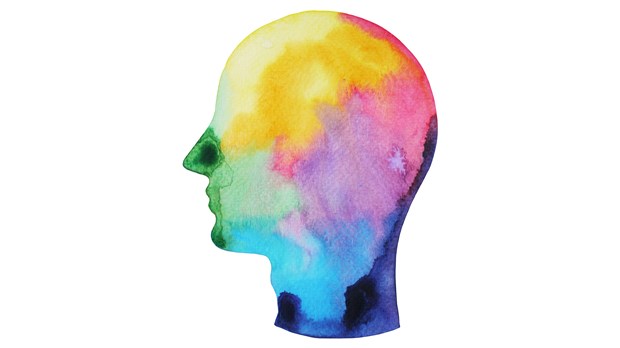Christian Mindfulness

I didn’t have time for a crisis on that particular Thursday. I had plans: oversee my fifth grader’s holiday party, stop in at my second grader’s holiday party, pick up my little ones from preschool, coordinate a tradeoff with the babysitter, and see a full list of clients at my counseling practice.
But I had a problem. I could see only out of one corner of my right eye. A freak accident a few days before involving my three-year-old and a large toy had led to multiple visits to the eye doctor. I was scheduled for a follow-up later in the week, but when I called and described my vision the doctor told me to come in immediately. The rest of the day was a blur of confusing words and experiences: detached retina, emergency surgery, total bed rest, vision gradually returning.
Losing my vision, even temporarily, has awakened me to how much I take for granted, things like peripheral vision, depth perception, driving, and reading and writing with ease. When our world comes to a screeching halt due to an illness, loss, or traumatic event, the old adage “You don’t know what you’ve got until it’s gone” feels less like a cliché and more like a grave prophecy. I wish it didn’t take a crisis to make me appreciate my beautiful, albeit ordinary and messy, life.
Mindfulness
Proponents of the practice of mindfulness suggest it can awaken us to our lives without the stimulus of a catastrophic event. Mindfulness can be defined as the “intention to pay attention to each and every moment of our life, non-judgmentally,” in contrast to the mindless way many of us live, as if on autopilot. Our technologically driven, hyper-busy, multitasking, always-plugged-in culture sets us up to function on overdrive. It is a disembodied, task focused, numbed out, distracted, and distracting way of life.
Mindfulness is a skill that provides an alternative path—one that empowers us to live as embodied creatures in the present moment, aware of ourselves and one another instead of only the task at hand. Mindfulness enables us to acknowledge how we feel instead of numbing or distracting ourselves from it. I am reminded of the old Gaither song “Fully Alive”: “Open my eyes to miraculous Monday. . . . Keep me awake and alive while I’m here.” That’s the heart of mindfulness: learning to be awake and alive.
The practice of mindfulness as a psychological and physiological technique is supported by compelling research suggesting that it can lower stress, boost resilience, regulate emotions, improve the immune system, increase positive emotions, decrease inflammation in the body, and promote quicker recovery after surgery. Taking a more mindful approach toward life is beneficial to both our physical and mental health.
A Buddhist Background?
Mindfulness is a buzzword in popular culture right now, and some are wary; surely anything that carries so much hype must be a passing trend. An even greater concern for some Christians is that mindfulness has historical roots in Buddhist meditation. Christians are rightly cautious about avoiding participation in a non-Christian religious practice; however, I believe we can be both faithful and discerning in our approach to mindfulness.
Meditation and mindfulness are not inherently Buddhist any more than prayer is the property of one particular religion. Meditation practices are part of the contemplative traditions of many religions, including Christianity and Judaism (which predates Buddhism). In fact, we can see principles of mindfulness expressed in Scripture and throughout Christian history.
For centuries contemplative Christians have taught the value of meditation and silence, the power of the breath, and the importance of experiencing God in the present moment. Thomas Merton, Brother Lawrence, Jean-Pierre de Caussade, and François Fénelon had been my guides in these Christian prayer and meditation practices long before I was introduced to mindfulness. As Richard Foster writes in Celebration of Discipline, “If we are constantly being swept off our feet with frantic activity, we will be unable to be attentive at the moment of inward silence. A mind that is harassed and fragmented by external affairs is hardly prepared for meditation.”
The Gift of Being Fully Present
Mindfulness offers unique benefits in teaching us how to remain in the present moment. Here are three simple skills you can borrow from mindfulness to help you be fully awake and alive
Take a breath. When faced with stress, anxiety, or pain, we instinctively tighten our muscles and hold our breath. Prayerful pauses throughout the day can help us move beyond temporary distress and into the peace of Christ: “Let my soul be at rest again,” the psalmist cries, “for the LORD has been good to me” (Psalm 116:7).
Taking five minutes to intentionally quiet our minds may bring an awareness of pain or tension. By breathing into that discomfort we learn to tolerate uncomfortable feelings instead of ignoring or pushing them away. When I soften into the fear and pain around my eye, I am reminded that “I can do everything through Christ, who gives me strength.” (Philippians 4:13). The constant dull ache around my eye is a physical sensation that I don’t like, but I can survive it.
Listen to your body. Your body is not the enemy. Many of us have a notoriously negative and distrusting relationship with our bodies. We are not skinny enough. Our legs are too bony. We have too much cellulite and not enough muscle. We have frown lines and crows feet. Our hair is too frizzy or too flat, too gray or too mousy. As a psychologist, I’ve spent a lot of time encouraging women to appreciate their bodies not just for how they look but for all the beautiful things they can do: give hugs, smell coffee, birth children, speak the truth in love, and do the Lord’s work.
When we experience pain, anxiety, sadness, or hurt, we feel those things in our bodies. By intentionally attending to what our bodies are experiencing, we open ourselves up to important messages. When I feel as if I can’t take another minute of something, I can ask myself what’s going on in my body. My eyes are squinting and strained; my chest is tight and my hands are curled into a fist. I can take a deep breath and remember that physical sensations are simply that. Just because I feel hopeless in a dark moment doesn’t mean my situation is hopeless. My body alerts me to painful feelings that I can then lay at the feet of Jesus. Lord Jesus, I pray as I breathe in through my nose. Help me, I pray as I release the air through my mouth and slowly and intentionally uncurl my fingers.
Notice something new. Harvard psychologist Ellen Langer has been studying mindfulness since the 1970s and suggests that the easiest way to incorporate it into your life is to simply notice new things. When I actively search for newness in my spouse, for example, he comes alive to me again. This helps me to engage in my relationships and life more deeply, which brings greater contentment.
Happiness is not found directly in trying to be happy, but it is a byproduct of engaging in life with others in meaningful ways. God created us in his image for relationship with him and relationship with others. When we become curious about our friends and family members or the folks in our churches and neighborhoods, we turn our gaze outward and allow God to do the good work of changing us for the sake of others.
Follow the Sunbeam
C. S. Lewis wrote, “One’s mind runs back up the sunbeam to the sun.” Mindfulness helps us notice the beauty of the sunbeam and experience its warmth. The true gift, however, lies in following the sunbeam all the way to its source, which is not my breath or my body or even the present moment, but Christ in and above and through all those things.
Today, even if I can’t see it clearly, I am looking at the sunbeam, basking in the heat, and remembering the source of the beauty all around me. Whether I can see it or not, I can “taste and see that the LORD is good” (Psalm 34:8).
Kim Gaines Eckert is a psychologist in private practice in Chattanooga, Tennessee. She is the author of Things Your Mother Never Told You: A Woman’s Guide to Sexuality and Stronger Than You Think: Becoming Whole Without Having to Be Perfect. You can find her at DrKimEckert.com.
Read more articles that highlight writing by Christian women at ChristianityToday.com/Women
 Read These Next
Read These Next


 Sports StressHow to help your child develop a healthy sense of competition
Sports StressHow to help your child develop a healthy sense of competition
 7 Things Not to Say to Someone Who's DepressedThese words can just make it worse
7 Things Not to Say to Someone Who's DepressedThese words can just make it worse








 Homepage
Homepage